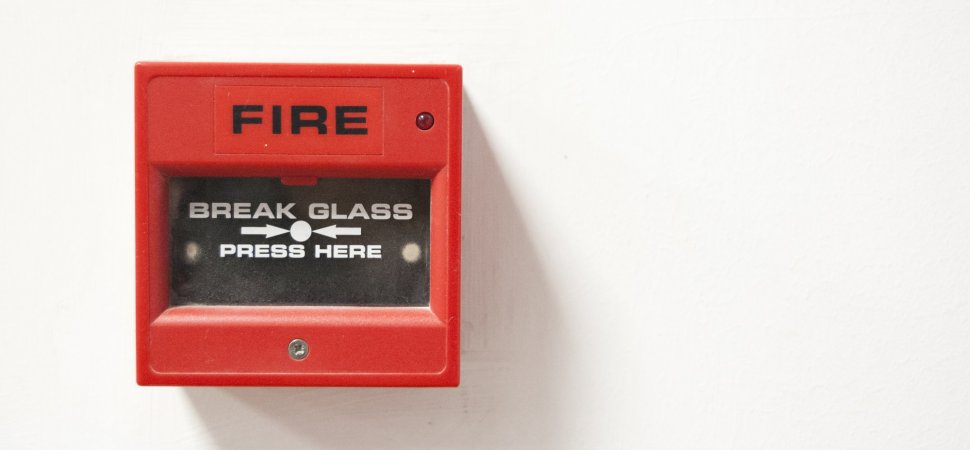- "Break glass in case of emergency" refers to a precautionary measure, often seen on emergency equipment. It signifies the need for immediate action or access to resources in critical situations, whether literal or metaphorical, with the breaking of glass as a last resort.
For example, a fire alarm might have a glass cover protecting the alarm activation button, and breaking the glass is necessary to activate the alarm in the event of a fire. Similarly, emergency exits might have a glass cover over the release lever that needs to be broken to open the door in an emergency.

In this article, it reports that "the National Emergency Number Association reports that unintentional calls account for anywhere from 25 to 70 percent of all 911 calls in some areas of the United States. And that doesn’t even include non-emergency or prank calls." These calls are not only annoying, but they are also a problem, as they could cut into the time of a real crisis. Thus, phrases such as "Break Glass in Case of Emergency" are measures put to create a blockage to these unnecessary calls for help.
When to Use Break Glass in Case of Emergency
The phrase "break glass in case of emergency" is typically associated with a physical or metaphorical emergency situation. It is often seen on emergency equipment, such as fire extinguisher cabinets, alarm switches, or emergency access points. The idea is that there is a pane of glass protecting the emergency item, and breaking the glass is a last resort action to access the tools or resources needed in an urgent situation.
"Break glass in case of emergency" is a clear instruction found on various equipment and containers, but knowing exactly when to take that drastic step requires careful consideration. Here are some scenarios where breaking the glass might be necessary:
1. Fire Emergencies:
- Accessing fire fighting equipment: This is the most common scenario. Breaking glass panels on cabinets containing fire extinguishers, hoses, or fire blankets grants immediate access to crucial tools for containing a blaze.
- Triggering a fire alarm: Some breakable panels are linked to a fire alarm system. Breaking the glass activates the alarm, alerting everyone in the vicinity and summoning emergency responders.
2. Medical Emergencies:
- Accessing emergency medical supplies: Similar to fire equipment, some cabinets containing AEDs (automated external defibrillators) or other critical medical supplies might have breakable access panels for urgent situations.
- Obtaining antidotes or specific medications: In rare cases, specialized containers holding antidotes for poisonings or specific medications for life-threatening allergic reactions might be secured behind breakable glass for immediate use.
3. Security Threats:
- Activating a silent alarm: Some buildings have breakable panels connected to silent alarms, silently alerting security personnel or authorities without broadcasting the danger to potential intruders.
4. Environmental Hazards:
- Accessing emergency breathing apparatus: In facilities with potential exposure to hazardous fumes or chemicals, breakable glass panels might protect emergency breathing equipment for immediate use.
Example sentences
- A firefighter's helmet hangs proudly on the wall, emblazoned with the words "Break Glass in Case of Emergency" beside a neatly labelled fire alarm. Its red casing gleams under the soft light, a silent sentinel ready for action.
- Inside a sleek glass box, nestled beside a first-aid kit and emergency blanket, lies a single vial labeled "Break Glass in Case of an Emergency." Its clear liquid shimmers ominously, a potent antidote waiting for the moment it's needed.
- High atop a mountain trail, a weathered wooden sign points the way forward, its weathered paint barely clinging to the wood. The stark message "Break Glass in Case of Emergency" is etched deeply, a reminder of the unforgiving wilderness beyond.
- In the sterile hush of a laboratory, a glass case safeguards a vial of experimental serum. Glowing faintly under a UV light, it bears the stark warning "Break Glass in Case of an Emergency," a potential cure resting on the precipice of desperation.
- A child's piggy bank, decorated with bright rainbows and cartoon animals, sits perched on a shelf. Pasted crookedly across its front is a note in childish scrawl: "Break Glass in Case of Ice Cream Emergency."
Examples from the web
"This approach is essentially viewed as a last-ditch, "break glass in case of emergency" desperation option in the event of such a failure." - The Guardian
"On most N.B.A. rosters, the third point guard occupies a break-glass-in-case-of-emergency role in the event the other two guards sustain injuries or are lost en route to the arena." - The New York Times - Sports
FAQ
Is it "break glass in case of an emergency" or "in case of an emergency break glass"?
The more common and widely recognized phrase is "Break glass in case of emergency." This wording is typically used to instruct individuals to break the glass when there is an emergency. The idea is that breaking the glass cover will provide access to whatever is behind it, such as a fire alarm, emergency tool, or emergency exit release.
However, the order of the words might vary on different signs or labels, but the meaning remains the same. The important part is the clear communication of the emergency action to be taken.
Is it "in case of emergency" or "in case of an emergency?"
In the specific phrase "break glass in case of emergency," the more common and widely accepted wording is "in case of emergency" without the indefinite article "an." Therefore, the phrase is typically written as "break glass in case of emergency." This wording is commonly used on signs, labels, or instructions indicating that a glass panel should be broken to access emergency equipment or take necessary actions in case of an urgent situation.
Summary
The phrase "break glass in case of an emergency" is a critical element of emergency preparedness. Understanding when and how to use it can make a significant difference in responding effectively to unforeseen situations. By familiarizing yourself with this simple yet powerful instruction, you contribute to creating a safer environment for yourself and those around you. Stay vigilant, stay prepared, and remember: Break glass only when it's absolutely necessary.

Want to sound like a native speaker?
Engram’s AI-powered grammar checker makes your English sound like a native speaker’s, suggesting natural English expressions on top of fixing grammar, spelling, punctuation, word order, and vocabulary.

References:













